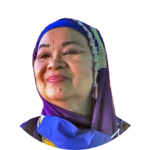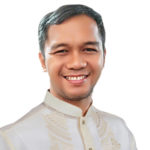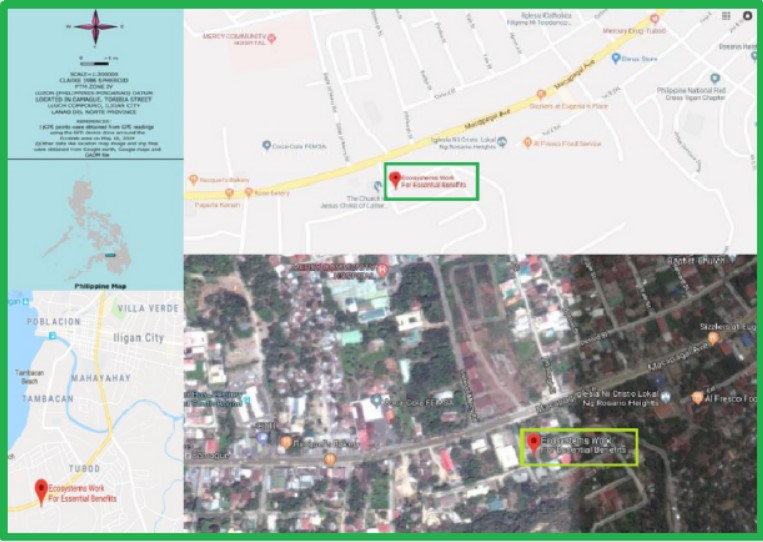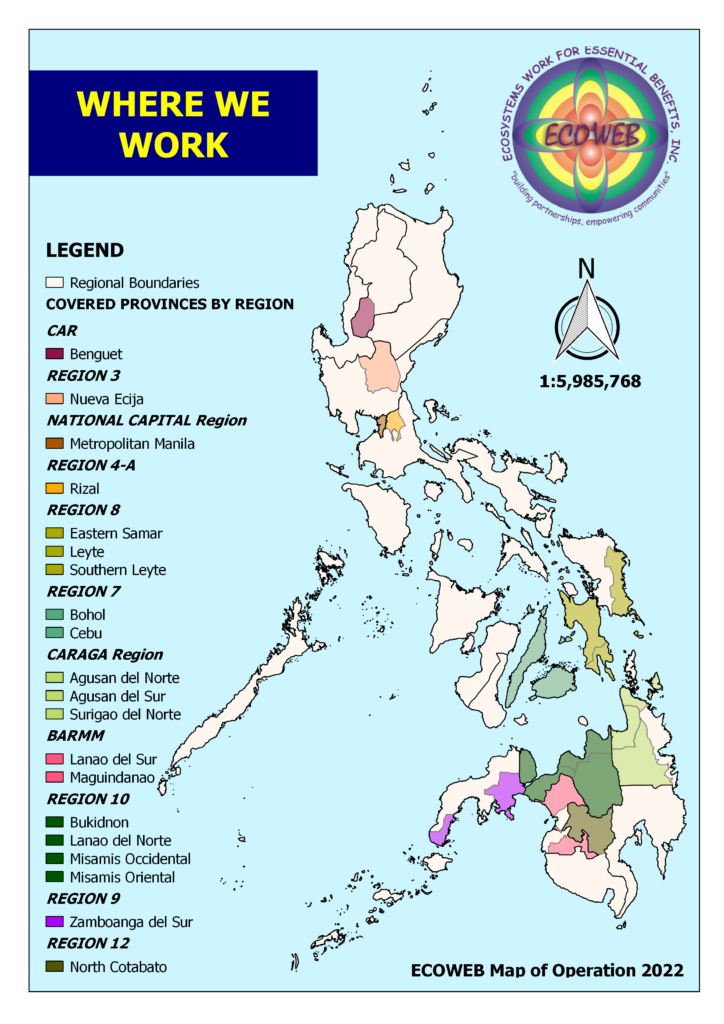- Iligan City, Lanao del norte
- (0917) 175 6459
- (063) 228-9617
- ecoweb@ecowebph.org
- ecoweb2006@gmail.com
A. Statutory Mandate
The Philippines Securities and Exchange Commission (SEC) COMPANY REG. NO. CN200628403 dated 30th day of May 2006 authorized the Ecosystems Work for Essential Benefits, Inc. as a registered non-stock, non-profit corporation. It defines its purpose to provide genuine alternative development that is ecologically sustainable, socially just, economically equitable, and politically participatory. It shall promote respect for human rights and human dignity, nurture spiritual, moral, intellectual, and cultural lives, identity and heritage of individuals, communities and people, all of which are the key factors in gearing towards total development.
B. Vision, Mission, Goals
ECOWEB envisions “A Peaceful and Progressive Society Living in a Safe Environment,” commits to its mission: “Building Partnerships, Mobilizing Resources, and Empowering Communities,” and hopes to achieve its five (5) major goals:
- Improved Social Relations
- Safe environment and resilient communities
- Sustainable livelihoods of communities
- Inclusive governance
- Sustainable local institutions
C. Program Strategies
ECOWEB’s programs and projects are focused in addressing the inter-linking problems of poverty, conflict, environmental degradation and climate change impact, and poor governance that make communities vulnerable to disaster risks both natural and human-induced. ECOWEB adopts an integrated approach in the implementation of its programs and projects that would be prioritizing the most vulnerable groups and communities to include communities of Internally Displaced People (IDP) due to disasters, war, armed conflict, development aggression, among other reasons, Indigenous People and minorities, conflict- affected communities, women, youth, children, small farmers, fisherfolks and rural workers, informal settlers, among other vulnerable sectors.
Under its 10-year Strategic Plan for 2017 to 2026, ECOWEB has adopted five (5) major program strategies which are being implemented in an integrated manner at the community level. These are:
1) Resilience Improvement Capacity Enhancement (RESILIENCE)
ECOWEB works for localizing response to global concerns about climate change and the increasing vulnerability of communities to both natural and human-made hazards. This program promotes Community-based Disaster Risk Reduction (CMDRR) and Integrated Risk Management (IRM) approaches in addressing disaster and climate risks and improving resiliency of vulnerable sectors and communities.
Improving local capacity for preparedness; response to, recovery and rehabilitation of the impact of disasters; mitigation of and adaptation to climate and disaster risks shall be aimed at in the capacity enhancement of partner communities and local groups and agencies. ECOWEB works for risk-informed local government land use and development planning to reduce climate and disaster risks and for enabling local systems and programs to improve resilience of vulnerable communities. Prevention and reduction of environmental disaster risks shall be aimed at through promoting community-based biodiversity, soil and water conservation, sustainable resource management technologies, and rational utilization of natural resources.
2) Responses in settings of crisis Emergencies (RISE)
In times of crisis and disasters, ECOWEB initiates humanitarian and crisis responses promoting the Survivor and Community-led Response (SCLR) approach. The SCLR approach aims to enable the most vulnerable crisis affected population to help themselves survive and rise with dignity, uphold their rights and harness their capacity to address their emergency needs as well as the root causes of their vulnerability to crisis and disasters.
SCLR approach promotes the provision of multi-purpose cash grants for the most vulnerable and marginalized families and communities. SCLR approach ensures gender-responsive, inclusive, culture-sensitive, empowering, do-no-harm and peace-enabling humanitarian response processes. Complementation of efforts and assistance with other agencies is also being endeavored to better enable the crisis affected to address their emergency basic needs and for the recovery and rehabilitation of their damaged livelihood assets and community basic service infrastructures. Enabling the crisis affected to lead and manage their crisis response upholding dignity is also considered a psycho-social strengthening action especially for the more vulnerable affected population.
Through the approach, it is aimed that the crisis affected will be able to immediately bounce and get back and better manage its development efforts towards resilience. SCLR is an approach that ECOWEB promotes to link humanitarian, development and peace.
3) Sustainable Livelihoods and Social Enterprises (SLiSE)
ECOWEB promotes sustainable resource (soil, water, forest) development and management technologies, endeavors for food security and productivity enhancements and develops community-based social enterprises following a value-chain approach as strategies for developing an inclusive sustainable local economy that would ensure benefits for the more vulnerable and marginalized. This is implemented integrating the concerns for the environment, gender and peacebuilding.
ECOWEB also initiates social enterprise strategies, facilitates access of services and support from the government and mobilize responsible investments for ensuring sustainable livelihoods and enterprises of communities and for sustaining its ECOWEB development programs.
4) Peace Action and Conflict Transformation (PACT)
ECOWEB advocates for Peace at the different levels of society by employing creative strategies such as Cinema for Peace and Historical Journey, among others. At the grassroots level, Peace Actions focus on transforming resource-based and other forms conflicts by enabling people in conflict and local institutions to initiate actions towards conflict transformation and resolution. The program also advocates for mainstreaming peace-building and conflict transformation concepts in local government development planning and programming and enables local actors to initiate policy advocacy for institutionalizing peace promoting programs. Peace-enabling actions also aims to address issue and prevent violent extremism.
5) Sustained Advocacy for Localisation and Inclusive Governance (SALIG)
ECOWEB works for the effective participation of the vulnerable and marginalized sectors in governance from local to national level. Capacity enhancement of community-based groups and local partners is being endeavored to effectively engage the government agencies through their designated representatives. ECOWEB facilitates effective people’s participation in development and land use planning, budgeting, monitoring and evaluation of government programs.
Capacity building of the Indigenous People groups/communities; Internally Displaced People; small farmers, fisherfolks and the rural poor; persons with disability; informal sector and urban poor, among others for their effective engagement with the local and national governments is a concern of this program. The cooperation and collaboration of women and men in a way that addresses power imbalance is being endeavored to have an effective lobby for making government policies and programs inclusive and responsive to the issues and concerns of the poor, marginalized and vulnerable.
Through this program, it is also aimed that local groups and institutions can be more capacitated to sustain their own development and peace initiatives while influencing policies, systems and structures at various level towards making governance more gender responsive, inclusive, peace-enabling, culture-sensitive, transparent, accountable and facilitative of sustainable development.
D. EcoWEB Core Values
In planning, setting priorities, and carrying out every aspect of its mission, the Ecosystems Work for Essential Benefits, Inc. is guided by five (5) interdependent core values:
a.) The People as the focus and the Ecosystems as locus of development
Responding to the needs and promoting the rights of the people without rendering any harm to the people or to other aspects of the ecosystems
b.) Respect for human rights and dignity
Respecting the rights and dignity of all people (women, children, cultural minorities and all other members in communities), and the diversity of people’s concepts, ideas, values, belief systems, and practices
c.) Ensuring sustainable development process
Development process should be environment-friendly and geared towards self-reliance that is geared towards meeting the needs of the present generation without sacrificing the future of the next generation.
d) Change as a process that involves internal and external factors
The people are the sovereign ones who are decisive in their development process and in carving their own destiny. Free from dictation, the people shall only receive assistance that will serve as catalyst, not as the determinant of change. Thus, together with other partner change agents, the organization will work with people in the communities who are decisive and committed to take active roles in the change process.
e) Integrity as an organizational value to maintain credibility.
Integrity is a value to be upheld within the organization to ensure responsible stewardship and accountability of all resources accessed in the name of the organization and communities. Like the starhub in a web, EcoWEB serves as a center that holds, and not as the centralized hub that controls. As such, it would create a platform of social spaces and facilitate linking and possible healing of strained relationships and generate multiple independent but coordinated connections that build up strength and recreate the same among agents of social change.
E. Governance and Operational Structure
EcoWEB’s system of management and governance also follows the core values of the organization.
The Board of Trustees mainly oversee the direction and thrusts of the whole organization, ensure cost-effectiveness and efficiency of the over-all operation and pool efforts to sustain all the developmental efforts of ECOWEB. Created bodies in the organization’s structure having direct management responsibilities are given commensurate power to be able to efficiently initiate decisions and actions. Decision-making will be facilitated by both formal and informal systems of coordination and communication but within the parameters of the organizational values and principles. Through this system, it is expected that right decisions are made and efficiently undertaken.
Highest Policy Making Body
The incorporators and duly invited and approved members of the organization will serve as the highest decision-making body of the organization that shall meet once a year for review and setting of direction and thrusts of the organization. From this body, the Board of Trustees is elected.
The Board of Trustees
The Board of Trustees is elected every two years by the General Assembly of members of the organization. They serve as the policy making body of the organization that would meet quarterly. The Board of Trustees serves to provide wisdom and guidance to the management towards the fulfillment of the organization’s vision, mission and goals.
The Board of Trustees consists of eight (8) members, one (1) of whom is an ex-officio member, who functions as the Executive Director. Officers of the Board include the President, Vice-President, Secretary, Treasurer, and Auditor. All officers are elected by the Board of Trustees from among themselves. Secretary, Treasurer and Auditor may also be designated by the Board from non-board members.
Board of Trustees

Elsa M. Maquiling
President

Preciousa B. Derro
Vice President

Jocelyn A. Pacaldo
Secretary

Luz C. Sevidal-Castro
Treasurer

Lloyd G. Cezar
Auditor

Atty. Romero P. Pacilan
Member

Peter D. Suson
Member

Regina S. Antiquesa
Executive Director / Founder
- Sectoral Representative, National Anti-Poverty Commision-Victims of Disaster and Calamities (NAPC-VDC)
- and NAPC-VDC Representative to the NDRRM
- CCSO Representative, Regional Disaster Risk Reduction and Management Council -Region 10
- PSR, RDC-10 Economic Development Committee
- Convenor, CLEARNet – Survivor/Community – led Responses to Crisis
- Coordinator, Bangon Marawi CSO Platform
- Co-Convenor, DRRNet Philippines
- Endorser, Charter 4 Change
- International Conveners Committee member, Alliance for Empowering Partnerships (A4EP)
F. How EcoWeb Evolves
Spatial operation evolution
We started as a local organization in 2006 focusing in the Indigenous communities and conflict-affected in the provinces of Lanao del Norte and Misamis Oriental in Region 10 and in Lanao del Sur of then Autonomous Region of Muslim Mindanao (ARMM). Through partnerships with various local, national and international partners, ECOWEB has able to expand its program operations in other regions in Mindanao including in Zamboanga Peninsula (Region 9), CARAGA (Region 13), Cotabato Province (Region XII) and other provinces in the now called Bangsamoro Autonomous Region of Muslim Mindanao (BARMM) to respond to humanitarian and development challenges.
In response to major disasters, in 2013, it started to expand its operation in the Visayas, particularly in Bohol (Region VII), Leyte and Eastern Samar (Region VIII), and in 2018 in Luzon, particularly in Benguet in the Cordillera Autonomous Region (CAR), and in 2020 in Rizal (Region VI-A) and Caloocan (National Capital Region (NCR).
Program Strategies Evolution
ECOWEB with a mission of Building Partnerships, Mobilizing Resources and Empowering Communities, was originally conceived as a development organization however, a year after its inception, it started responding to emergencies due to armed conflict in the Lanao provinces. In 2008, it adopted Disaster Risk Reduction (DRR) as one of its key development strategies.
In 2011, ECOWEB started responding major disasters caused not anymore by armed conflict but by devastating typhoons such as Typhoon Sendong (Washi). In 2013, when it decided to respond to the impact of typhoon Yolanda (Haiyan), it defined itself as both developmental and humanitarian organization.
ECOWEB’s experience in responding to humanitarian crisis especially at the stage of recovery and rehabilitation, made the organization realize the importance of working on the nexus of development and humanitarian work where community participation and leadership is key. In 2017, ECOWEB embraced and promoted the Survivor and Community-led Response (SCLR) to crisis approach which concept embodies development principles in humanitarian work.
Since 2017, SCLR approach has been applied by ECOWEB with local partners in various hazards and crisis settings around the country to include typhoons, (flash) flooding, massive landslides/mudslide, earthquakes, Marawi crisis, and in COVID-19 pandemic.
SCLR crisis response approach is integrated in the DRR program. This gained sub-national government recognition from 2016 to 2018. This series of recognition made the organization a national nominee to the Gawad Kalasag Award, the highest national recognition to a government unit and NGO/CSO working on DRR. ECOWEB garnered the national Best CSO – Gawad Kalasag Award 2019 for its SCLR approach to crisis.
G. EcoWEB Networks
ECOWEB serves as the lead convenor of the Community-led Emergency Action Response Network (CLEARNet) and co-convenor of the Philippine Disaster Risk Reduction Network (DRRNet Phils).
In 2015, ECOWEB decided to actively participate in the international effort to formulate the Sustainable Development Goals (SDG) through its active involvement in the Beyond 2015 Campaign. This international effort further facilitated ECOWEB’s engagement with the Charter for Change (C4C), a global commitment of INGOs to localization of aid. EcoWEB is among the local/national CSO endorsers and sit as a member of the global Coordination Group of C4C.
In 2018, EcoWEB joined the Alliance for Empowering Partnership (A4EP), a global alliance of various NGOs operating mostly in the global south campaigning for localization of aid. ECOWEB, represented by its Executive Director, is the concurrent Chair of A4EP.
H. Government Representation
ECOWEB sits in the Victims of Disasters and Calamities (VDC) sectoral council of the National Anti-Poverty Commission (NAPC) since 2015 and EcoWEB Executive Director serves as the Sectoral Representative. As NACP-VDC Sectoral Representative, the EcoWEB Executive Director sit in the National Disaster Risk Reduction and Management Council (NDRRMC) since 2015 until at present.
ECOWEB is accredited in various local government units and in regional (sub-national) government bodies. EcoWEB sits in some local DRRM Councils and Development Councils where the organization is operating. EcoWEB is a member of the DRRM Council and Regional Development Council- Economic Development Committee (RDC-EDC) of Region 10 and in the BARMM Economic Development Council. ECOWEB is also a member of the Mt. Inayawan Protected Area Management Board (PAMB).
I. Map of Operations

J. Where We Work



